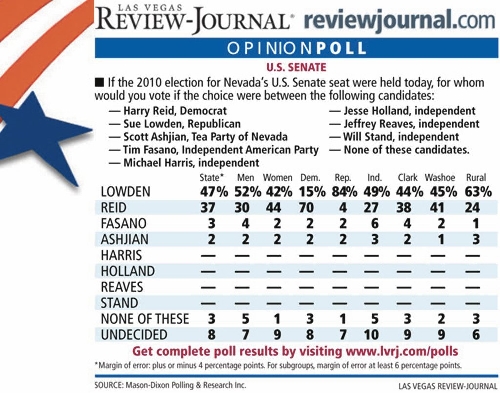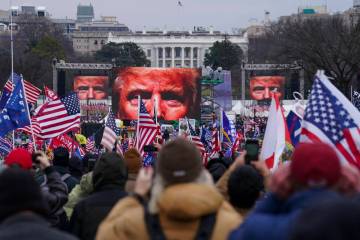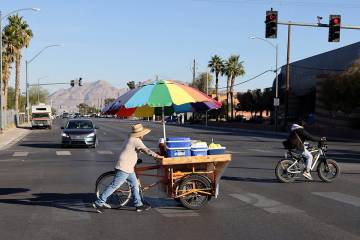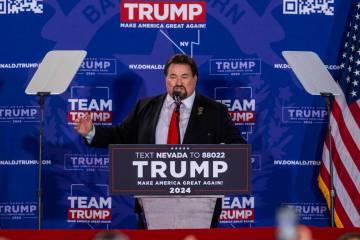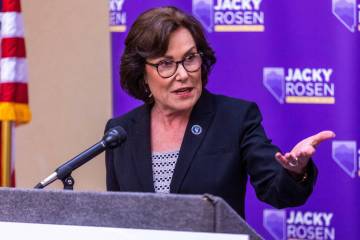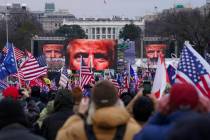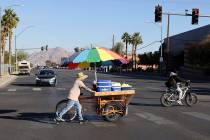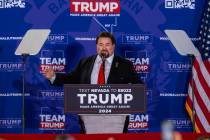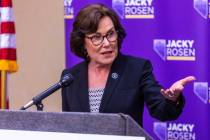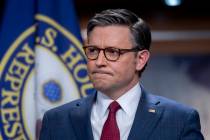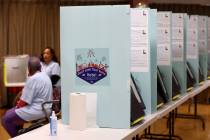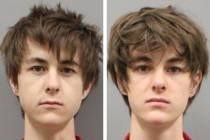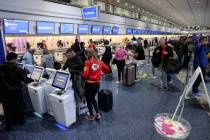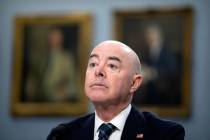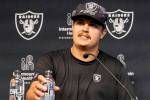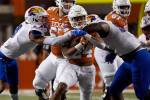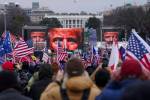Poll: Reid loses full ballot test
U.S. Sen. Harry Reid must pick up far more support from crossover Republicans and independents to win re-election, according to a new poll that shows him losing to the GOP front-runner in a full-ballot election with eight contenders and a "none of these candidates" option.
The survey of Nevada voters commissioned by the Review-Journal shows Reid getting 37 percent of the vote compared with 47 percent for Republican Sue Lowden, who would win if the election were today, while the slate of third-party and nonpartisan candidates would get slim to no backing.
The latest Mason-Dixon poll for the first time measured Reid's and Lowden's support in a full general election test instead of in a head-to-head or three-way matchup to see how much of the vote the record number of Senate candidates on the Nov. 2 ballot would siphon off from the Democratic incumbent and the top GOP challenger, pollster Brad Coker said.
"The bottom line is that adding all these minor candidates won't really bleed support away exclusively from the Republican," Coker said. "They're not really bleeding much support from either candidate, Reid or Lowden, and if they do siphon off votes, it'll probably be about half and half."
According to the poll, the four nonpartisan candidates wouldn't pick up any measurable vote. Tim Fasano of the Independent American Party and "none of these candidates" would each get 3 percent, Scott Ashjian of the Tea Party of Nevada would get 2 percent, and 8 percent of voters are undecided.
Eight or nine out of 10 voters don't even know the names of the four nonpartisan contenders, according to the survey, which also found less than half of Nevadans recognized Fasano and Ashjian, a former Republican who isn't supported by local and national members of the Tea Party movement.
Ken Fernandez, a political science professor at the University of Nevada, Las Vegas, said voters rarely choose third-party and nonpartisan candidates in close races in which the stakes are high -- as in the nationally watched Reid race -- because "people don't want to throw away their vote."
"When people think it could matter, those third parties -- or what academics call 'protest parties' because it's really a vote against another candidate -- get less support," Fernandez said.
Previously, Reid and his campaign have argued that the senator would win any general election contest because the full slate of candidates would splinter the vote, allowing him to eke out a slim victory with less than half the total. But the new poll discounts that re-election scenario.
Still, Reid spokesman Jon Summers sounded confident Thursday that Reid could win a fifth term.
"Senator Reid is talking to all Nevadans, regardless of their political party," Summers said in response to the poll showing weak support from nonpartisan and GOP voters. "He has a history of reaching across the aisle to get things done for Nevada, and we will spend the next several months making sure people know how he is working to create jobs, keep people in their homes and get our economy back on track."
Summers also criticized the new Mason-Dixon survey taken Tuesday and Wednesday and previous polls commissioned by the Review-Journal, saying they weren't scientifically sound because they relied on random telephone dialing, although that is common practice among pollsters.
"While the Review-Journal is spending its time reporting on flawed polls to try to support their candidate, they should be asking the Republican candidates where they stand on issues, like which parts of health insurance reform they would repeal and where they stand on providing unemployment for out-of-work Nevadans," Summers said.
The latest Mason-Dixon survey questioned 625 Nevadans who said they are registered and vote regularly. It has a margin of error of plus or minus 4 percentage points. The error rate increases to at least plus or minus 6 percentage points when focused on subgroups such as political parties.
Fernandez and other analysts who discussed the poll findings said Reid's challenge is to win back more Republicans and nonpartisans, who make up 15 percent of the Nevada electorate, because those voters are now heavily supporting Lowden and his other potential GOP opponents.
"That would save him," Fernandez said, noting that is how the senator has won tight races before. "Reid is vulnerable, and this is his toughest election, but I don't count any incumbent out."
According to the poll, Reid is picking up 4 percent of Republican voters and 27 percent of independents while Lowden is winning 84 percent of the GOP vote and garnering 49 percent of the swing nonpartisan voters, whom analysts said will make the difference in the 2010 race.
As for Democrats, Reid is getting support from 70 percent of his own party compared with 15 percent for Lowden, mostly because conservative Democrats in rural Nevada often vote Republican, analysts say.
That's a far cry from Reid's razor-close 428-vote recount victory over John Ensign in 1998 when independents and Republicans gave Reid the edge. Ensign later won a U.S. Senate seat in 2000.
Ahead of that 1998 election, a September Mason-Dixon poll showed Reid defeating Ensign for the independent vote 48 percent to 41 percent. Meantime, Reid was pulling in 16 percent of the Republican vote and Ensign 17 percent of the Democratic vote with both candidates enjoying crossover support.
In 2010, however, the political atmosphere for Reid has changed now that he's the Senate majority leader, a position that gives him power but also makes him a target for people unhappy with the Democratic Party's support for health care legislation and government bailouts.
In fact, Reid and his campaign are well-aware of the kinds of voters he needs to attract to win. During his kick-off re-election tour in early April, the senator rode a campaign bus through rural parts of Northern and Southern Nevada, often through Republican-leaning counties such as Douglas and Churchill. And he made a point of thanking Republicans in the Democrat-heavy crowds for their support.
The native of Searchlight, an old mining town, also has run TV ads highlighting his humble, rural roots, and run commercials focusing on his help for projects such as CityCenter that have created jobs. But he hasn't gained traction yet and has been stuck at support from four of 10 voters, according to the polls.
Reid also needs to shore up his backing from men as Lowden holds a 52 percent to 30 percent advantage over Reid, mostly because Nevada males tend to be more conservative, pollsters said.
The two are splitting the female vote with Reid besting Lowden, 44 percent to 42 percent in the poll.
Conservative rural Nevada belongs to the Republicans with Lowden gaining 63 percent of that relatively small slice of the electorate compared with 24 percent for Reid, according to the poll.
The two are splitting the Washoe County vote, 45 percent for Lowden and 41 percent for Reid.
And in Clark County, where Lowden is known from her former TV broadcast days and Las Vegas casino ownership, Reid is behind, with 38 percent of the vote compared with 44 percent for Lowden.
Previous Mason-Dixon polls have focused on all of the top Republican contenders, including businessman Danny Tarkanian, an ex-basketball star at UNLV, and former Reno Assemblywoman Sharron Angle, who the polls have said could defeat Reid in a general election.
Lowden is leading the pack of a dozen GOP candidates by double digits in the June 8 primary, according to the last two polls conducted by Mason-Dixon.
Less than two months ahead of the primary, the race is still up for grabs given the volatile electorate and possible missteps Lowden could make as she comes under near-daily attacks from Reid and from her GOP opponents taking aim at the front-runner, most analysts said.
And Reid is well-prepared to outspend his ultimate opponent, having raised $16 million this election cycle and with $9.4 million in cash on hand, according to his latest fundraising report as of March 31.
He plans to raise a record $25 million to defend his seat, according to his campaign.
With that much money, Reid can tear apart his opponent's record and make voters feel the Republican isn't up to the Senate job, said Nathan Gonzales of the Rothenberg Political Report.
"It's up to Reid to change the dynamics of this race," Gonzales said. "He's going to have to completely demonize the Republican in the race, and he's got the money to do it."
Contact Laura Myers at lmyers@reviewjournal.com or 702-387-2919.



